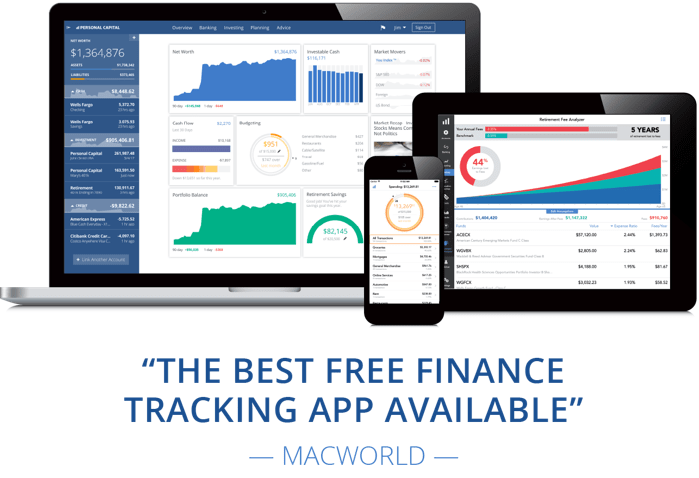Personal Capital vs. Betterment – Complete Ranking and Comparison Review
Historically, wealth management was a system reserved for the ultra-wealthy. The phrase brought to mind smoky, cigar-filled back rooms, nights on Wall Street, private jets, and parties on private luxury yachts. But, with the rise of the mass affluent or the middle-class workers with funds to invest, wealth management has slowly opened its doors to everyone.
The Betterment investing app and the Personal Capital app are two of the newest ways that mass affluent individuals and households, or anybody else, can invest, analyze, and manage retirement funds.
Both programs target individuals who were traditionally considered insufficiently wealthy for traditional services. Both feature web-based software, intensive customer support, and flashy apps for phones and tablets.
However, while the Betterment investment scheme and the Personal Capital app both offer new, algorithmically-driven ways to management investments, the programs are actually quite different from each other. If you’re trying to choose between the two options, keep reading. In this article, we will go over the key features of both, as well as the good and bad points of each.
See Also: The Top 5 Robo-Advisors (Reviews) | A Changing Trend in the Robo-Investment Field
Personal Capital vs. Betterment: An Overview
When deciding on Betterment vs. Personal Capital, a number of factors come into play: services offered, the security of financial information, and fees. Both programs offer low-cost automated investment services, which make managing funds something even the least mathematically-inclined person can easily manage. Both avoid the newest, flashiest ways to invest in favor of stability and long-term growth.
>> Sign up for Personal Capital Now! <<
Despite the similarities, however, the two programs are actually quite different from one another. Betterment is similar to an investment company, while Personal Capital provides an overview of a user’s complete financial picture. Let’s compare the features and costs of each.
PERSONAL CAPITAL
The Personal Capital app and website
The Personal Capital app was founded by Bill Harris, the former CEO of Intuit and PayPal. Before launch, Harris raised $28 million in venture capital and hired the best employees available. In fact, the majority of their employees come from finance backgrounds and are designated as Certified Financial Planners or CFPs.
Today, Personal Capital has almost one million users and helps users manage more than $208 billion in outside assets via a free online program. It manages an additional $2 billion invested directly with Personal Capital through a Registered Investment Adviser service listed with the SEC.
Personal Capital is more of a money management program than a hobbyist investor’s platform. Passive income is prioritized over the get-rich-quick schemes favored by day traders a decade ago.
People who are looking for long-term, safe investments, people who are completely new to saving for retirement, and DIY-types who are looking to minimize fees will all benefit from the services offered. Those seeking a riskier, high-yield platform will want to look elsewhere.
What is Personal Capital?
Personal Capital brings wealth management to the general public. In the past, such services were reserved for the wealthiest customers, as only the rich could afford the large firms’ fees. Portfolio analysis was done by a few people with specialized knowledge, and the rules were overwhelming to most individuals who tried to invest on their own.
Now, with much of the analysis work done by computers, investment advisory services can be offered to a larger audience, and each service brings with it low rates, accessibility, and honesty.
At its heart, Personal Capital is an “account aggregator” service. No matter how many investment accounts an individual has, Personal Capital will analyze and present data in a vibrant, easy-to-understand display. Daily updates are shown in charts and graphs that offer details including:
- Net worth
- Account balances
- Income reports
- Spending reports
- Asset allocation
- Investment returns
- Projected investment fees
Spending and bills can be tracked down to the penny, and payment details are easy to chart. Users can follow their progress as they work toward retirement or saving for big expenses, and through the Personal Capital app, they can also track the projected income and risks of their portfolio.
>> Join Personal Capital for Free Here! <<
In addition to the free wealth tracking services, Personal Capital offers paid investment and financial portfolio management services. This is where they make most of their money. Upon joining, you will receive a call from a company representative who handles investment products and services. Sales tactics are low pressure, and it’s easy to say no.
Whether or not you choose to use the paid services, you will be assigned to a personal advisor. The advisor works with Personal Capital’s investment committee to manage funds, and their direct contact information is available on the Personal Capital site. It should be easy to contact your personal advisor, as each one is assigned to just 200 accounts.
Is Personal Capital Safe? A Look at the Security Features
The Personal Capital app offers excellent security, including two-factor authentication. Each device used to access the data must be separately registered via a phone call or email. Personal Capital security is further enhanced by military-grade encryption, PassMark authentication, off-site secure financial data storage, and two-factor authentication.
Continuous monitoring keeps track of all activity, and users receive notification of every login and transaction. A daily email shows every charge, payment, deposit, and withdrawal for each linked account.
Types of Accounts Supported by Personal Capital
Individuals who sign up with the Personal Capital app can link and track many different types of financial accounts, including:
- IRAs
- Roth IRAs
- Joint accounts
- Trusts
- Taxable accounts
- Credit cards
- Student loans
- Mortgages
- Car loans
>> Join Personal Capital Now, It’s Free! <<
To use Personal Capital’s investment services, you must make a minimum deposit of $25,000. This money can be allocated toward a handful of products that provide a maximum return with minimal risk. Fees and taxes are clearly shown and have been reduced to the bare minimum. Investors could potentially save hundreds of thousands of dollars in fees by the time they retire.
Don’t Miss: Top 6 Best Online Financial Advisors (Human Advisor, Robo-Advisor, and Hybrid)
The Personal Capital App’s Fees and Taxes
Personal Capital offers a robust free service. Every account is assigned to a personal financial advisor who gives advice even to users who have not invested any money. Services such as the retirement fee analyzer, net worth analysis, and goal trackers are offered at no cost to all users. Investment allocation analysis (between mutual funds and stocks for) is also presented for free.
When an individual chooses to use Personal Capital’s investment services, fees are charged. While the fees are slightly higher than those charged by similar online choices, the cost is lower than the typical high price of traditional investment plans. Much of the savings comes from the company’s use of Exchange-Traded Funds, or ETFs. These investment vehicles act like mutual funds but come with low fees and can be traded like stocks.
The fee structure for the Personal Capital app’s paid services is straightforward:
- Up to $1 million invested: 0.89%
- $1 million to $3 million invested: 0.79%
- Next $2 million invested: 0.69%
- Next $5 million invested: 0.59%
- Over $10 million invested: 0.49%
Users should note that Personal Capital utilizes a “tax reduction philosophy,” and this savings often outweigh the fees charged. By using a method known as tax-loss harvesting, the tax rates are minimized. This benefit increases as the size of the portfolio increases.
Distinguishing Characteristics of the Personal Capital app
While Personal Capital does not provide budgeting software, they do offer a number of free tools to aid users in tracking spending and managing funds. For example, there is a net worth tracker, a portfolio tracker, a mutual fund analyzer, and a fee analyzer. The user can create various scenarios to help decide how funds should be allocated, and real-time charts show income and expenses.
Get Started with Personal Capital’s Award-Winning Tools!
The fee analyzer, in particular, helps users avoid costly investments. By adding up lifetime fees for each account, the Personal Capital app shows the user which accounts are the most expensive. A user can then decide whether or not to move their money into a lower-cost program.
Personal Capital seems to be targeting a high-net-worth clientele–not quite wealthy enough to need a personal financial advisor, but wealthy enough to need individualized attention. The fees for this are slightly higher than those charged by similar online services. But the attention given to managing all accounts, whether or not they are invested with Personal Capital, is first-rate. Few services offer so many free (and useful) features.
Click Below to Open Your Free Account with Personal Capital
>> Open Your Account with Personal Capital <<
BETTERMENT
The Betterment investment app and website
Betterment is a service targeting young investors and individuals who want to track their progress toward savings and retirement goals. It offers a website and app which help users chart big-picture financial progress, and it provides wealth management services. Betterment promotes low-risk, low-effort investment, and the design of both the app and website reflect this philosophy.
Unlike with Personal Capital, Betterment is designed mainly for investing money. And, in fact, making a deposit to Betterment is as easy as opening a bank account. However, while funds are guaranteed against fraud and mismanagement, deposits are not FDIC insured.
Betterment was designed to make saving for retirement as easy as possible. Their system helps users create various scenarios and aids in determining how much must be saved each month in order to meet future financial targets. The goal for all users is maximum return with minimum risk.
An account can be opened without an initial deposit. Once funds are transferred to the account, however, Betterment gets to work. Users can choose the percentage of money allocated between stocks and mutual funds, but beyond that, most of the work is done by computers. It is simple to set a savings plan up and then forget about it. Users are not required to log in, although many tools are available for those who want to analyze and track their investments.



Is Betterment safe to use?
Betterment uses best-in-class security to protect linked accounts and invested funds. The measures they use include:
- Fraud protection
- SIPC coverage up to $500,000 (in the case of fraud or mismanagement only)
- 256-bit SSL encryption
- A privacy policy which includes the promise that information will never be shared without consent
The security features used by Betterment investment are the same as the measures required of commercial banks.
Types of accounts supported by Betterment
The free planning services from Betterment are available to all users, even those who have not invested. However, Betterment is really targeted to those who are looking to save for retirement. Unlike the Personal Capital app, Betterment’s tools for financial analysis are designed mainly to complement their investment products.
If you deposit money into a Betterment account, you are limited in the type of investments you can make. They offer a blend of stock ETFs and bond ETFs through Vanguard and a handful of other trusted companies. The funds provide a balance between that of U.S. interest rate and credit risk and that of international interest rate and credit risk.
The actual funds your money is invested with will depend on how you have chosen to diversify your portfolio. Before putting your money with Betterment investment services, you can use their tools to create a number of different scenarios based on your income, savings ability, age, risk tolerance, and the number of years until retirement.
The Betterment returns will, of course, depend on how you have allocated your investment. A younger investor will probably have a larger number of stocks than bonds. As you get closer to retirement, you will probably reduce risk by having more bonds than stocks.
Betterment investment fees and taxes
The basic Betterment services are free to use. But, if you choose to invest money with them, you will pay a fee based on your account balance.
An account with less than $10,000 is charged an annual rate of 0.35% as long as you deposit at least $100 per month. If you deposit less than $100 per month and your balance is under $10,000, the fee is $3 per month. Investments between $10,000 and $100,000 are billed at a rate of 0.25% annually, and investments over $100,000 are charged an annual rate of 0.15%.
All Betterment investment accounts are also subject to standard investment fees. The company works to minimize these costs, however, through analysis of gains and losses before making any sales.
Distinguishing characteristics of the Betterment investment plan
Betterment performance depends on the amount invested, but all users who have a taxable account can take advantage of automated Tax Loss Harvesting. This is a complicated plan which offsets capital gains by selling depreciated assets. Benefits increase as the size of the investment increases; if Tax Loss Harvesting had been done over the past 10 years, Betterment returns would have been 0.77% higher.
In addition, Betterment investment plans have a feature called Smart Rebalancing. This service monitors your portfolio to make sure it maintains your preferred ratio of stocks to bonds. If the ratio changes, the service automatically rebalances your funds by using available cash and dividends.
One of the newer features available to investors is a program called SmartDeposit. This service allows you to automatically invest any money in your bank accounts that is over and above a user-determined threshold. SmartDeposit encourages investment, but transfers can be canceled on an as-needed basis.
Betterment also offers fractional investing, which means that every available dollar is utilized at all times. This service is not available to the average investor.
State of the Art Finance Software (Click Below)
>> Open Your Account with Personal Capital <<









Betterment vs Personal Capital – which to choose
Both Betterment and Personal Capital have received uniformly positive reviews, and in the Personal Capital vs. Betterment competition, there is no clear winner. For most, choosing between the two will depend mainly on personal preference. Both have slickly-designed websites and user-friendly apps, and both make it relatively easy to keep an eye on investments.
If you plan to invest money with either service, however, the choice may depend on how much you have to invest. Betterment’s fees are slightly lower, but Personal Capital is more affordable for those who are just starting out. If you would like personalized telephone service, you might prefer to take advantage of Personal Capital’s individual financial advisors. But, Betterment’s proprietary analysis tools might prove more appealing.
If your goal is mainly to track existing accounts, Personal Capital definitely offers more. Their portfolio tracking service provides fast and easy access to every account. But, Betterment’s services are similar if not comparable.
It’s free to start an account at both sites, so your best bet may be to start with both and see which you prefer. Either way, we think you’ll be in good hand.
► Get Your Free Access to Personal Capital ◄
AdvisoryHQ (AHQ) Disclaimer:
Reasonable efforts have been made by AdvisoryHQ to present accurate information, however all info is presented without warranty. Review AdvisoryHQ’s Terms for details. Also review each firm’s site for the most updated data, rates and info.
Note: Firms and products, including the one(s) reviewed above, may be AdvisoryHQ's affiliates. Click to view AdvisoryHQ's advertiser disclosures.







